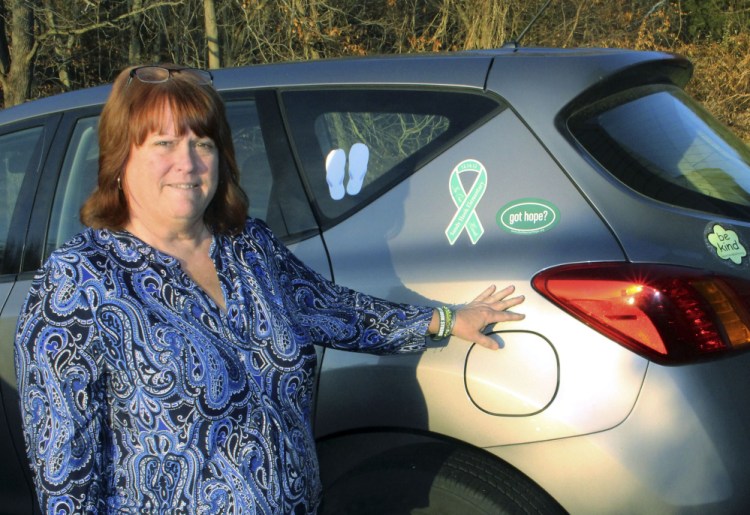NEWTOWN, Conn. — Suzanne Davenport still wears a memorial bracelet and has a green ribbon with a “Be Kind” magnet on her car to honor the 26 children and educators killed at the local elementary school. A resident of Newtown’s Sandy Hook section, she knew some of the victims, and she knows survivors.
But like many of her neighbors, Davenport often avoids telling strangers she is from Newtown.
“I was recently at a wedding shower, and a woman saw my bracelet and said, ‘Oh, you’re from Sandy Hook?” Davenport said. “And she started in. I said, ‘This is a shower, let’s just let it be a happy occasion.’ She started in again and I had to say, ‘I really don’t think this is the time or the place to be discussing this.'”
Five years into the town’s recovery, residents have adopted various strategies to deal with being from a place whose name has become synonymous with horrifying tragedy. A young man gunned down 20 first-graders and six staff members at Sandy Hook Elementary on Dec. 14, 2012.
When they travel into the world beyond the otherwise bucolic bedroom community of 28,000 people, some Newtown residents keep their roots to themselves to avoid debates over gun control and mental health. Others have found themselves dealing with awkward silences, or accepting condolences on behalf of an entire town.
It can be just as difficult to get no reaction when telling people they are from Newtown, said Eileen Byrnes, a yoga instructor who has lived in town for 30 years.
“I want to say to them, ‘Did you forget? Do you not remember what happened? How can you not know that this happened?'” she said. “So, when you are outside of Newtown, it’s a very interesting dance of how to react or how not to react.”
It’s a familiar burden to people from other communities that have become known to the world through mass shootings, including at Columbine High School and Virginia Tech, and more recently in San Bernardino, California, and Sutherland Springs, Texas.
Jane Hammond, who was superintendent of schools for Jefferson County, Colorado, at the time of the 1999 shooting at Columbine, said the connection to the massacre became inescapable for the entire district.
“We had 144 schools in our district, and people decided the name of the district was Columbine,” she said.
“I don’t think the pain goes away. You learn to live with it,” Hammond said. “But anniversaries are hard. The only tears I shed at the time were at the children’s funerals and a staff member’s funeral. On the fifth anniversary, I sobbed.”
At Virginia Tech, where a gunman killed 32 people in April 2007, the tragedy will always be identified with the university – but so will the way the school responded, spokesman Mark Owczarski said.
“I think people saw the true character of Virginia Tech, Sandy Hook, Orlando; more recently Las Vegas and Sutherland Springs,” he said. “It’s what people see in that time that defines you. People saw our community coming together and standing together.”
Pat Llodra, who led Newtown through the tragedy as the head of its governing board, said most people she meets just want to express how deeply they were touched, and she gladly accepts the grace of the outside world.
But, she said, there is a delicate balance between honoring the past and being defined by it. The town has always been a safe place for families, with good schools, she said.
“This is something that happened to us; we didn’t cause it,” said Llodra, who recently retired. “It’s part of our history, but it is not who we are.”
The tragedy is still present for residents in different ways, said Mary Ann Jacob, who was a library clerk in the school the day of the shooting and hid students in a supply closet.
“Some days it sits quietly by your side, and you acknowledge it and know it’s there and move on with your day,” she said. “Other days it’s a really hard, difficult burden to bear.”
Robin Fitzgerald once took a group of older Newtown kids to Michigan to compete in an international problem-solving competition. The reaction to her team – with coaches and parents constantly trying to acknowledge the Sandy Hook shooting – became a problem.
“Our kids just wanted to go and be just who they were,” she said. “We felt like we had to get between our kids and people who were legitimately just trying to give them love. They would burst into tears, and our kids had no idea what to do, what to say.”
Some improvements have come from the town’s trauma, Jacob said. Neighbors have gotten to know one another, and many have become involved in charities or community projects.
It’s a lesson, she said, the outside world can learn from Newtown.
“Stop telling me how bad you feel, and do something,” said Jacob, who became the chair of the town’s legislative council in 2013. “Make a difference.”
Send questions/comments to the editors.


